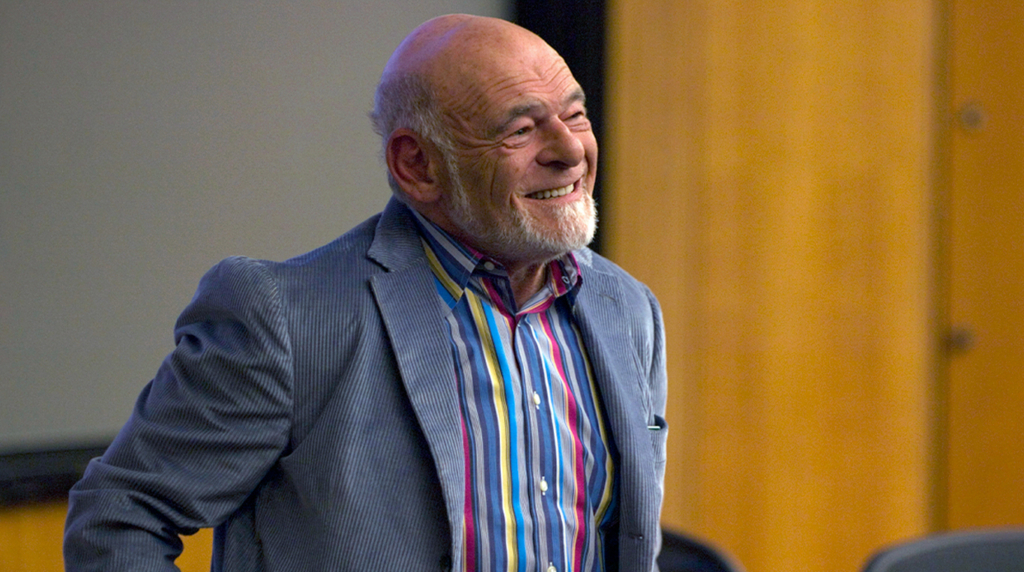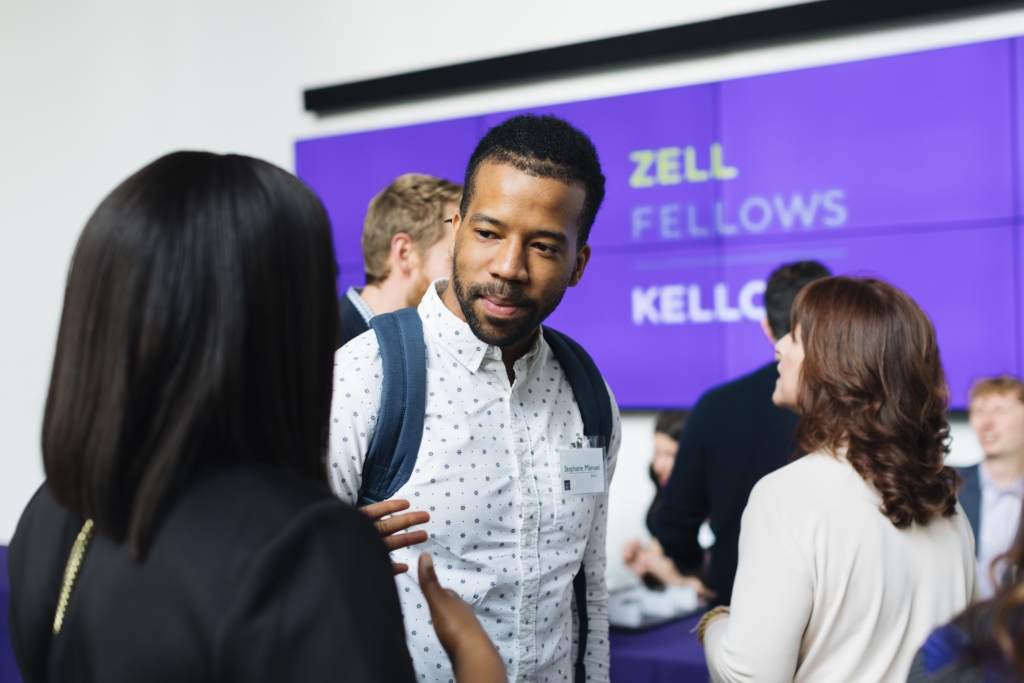
Sam Zell funded entrepreneurial education programs at schools around the world, including the Zell Fellowship program at Northwestern Kellogg. In 2007, he was awarded Kellogg’s Distinguished Leadership award. Courtesy photo
The unofficial creed of Kellogg School of Management’s Zell Fellowship Program goes something like this: Push the boundaries. Take risks. Try something a little crazy. It’s a motto adopted from the program’s benefactor, Sam Zell.
Program director David Schonthal had an idea just crazy enough to put the motto to the test: Take the entrepreneurial fellows to a Los Angeles recording studio just to play around with the creative process. Zell, a billionaire real estate investor and entrepreneur, thought it was a great idea.
So that’s what they did. Last year, 20 Zell fellows spent four hours at The Village Studios writing, performing, and recording their entrepreneurial themed song, “You Will Know My Name.” The backing band included the lead singer for Vertical Horizon, the bass player from Supertramp, the keyboard player from the Goo Goo Dolls, and Schonthal on drums.
The fellows didn’t come away with an investor pitch, or go-to-market strategy. But they did write an ear-wormy pop tune with a catchy keyboard hook:
“Game time/ Get me to the finish line/ Tired of being outside/ Swimming hard against the tide/
“Rain drops/ Falling on the rooftop/ Drifting through the fog/ With my thoughts/ La la la la la
“You will know my na – eh – eh – eh – eh – ame / Not afraid to wander / Getting even stronger/
“You will know my na – eh – eh – eh – eh – ame / Nothin’s ever easy / I’ll get it done, believe me/ You will know my name”
“I can’t think of very many people in the world that have the creative flexibility in the interest in pushing the edges just to push the edges. We feel super lucky to have somebody like Sam in our corner because he always wants us to improve. He never wants us to rest on our laurels,” Schonthal told Poets&Quants in an interview shortly before Zell’s death on May 18 at the age of 81.
A MILESTONE & END OF AN ERA

Stephane Manuel, MBA ’19, founder to TrueFiktion, attended Northwestern University’s Kellogg School of Management celebration of its Zell Fellowship Program on May 18. Earlier that day, the program’s benefactor, billionaire entrepreneur Sam Zell, died at the age of 81. Photo by Azuree Holloway
2023 marks the 10th year of the Zell Fellowship Program, a highly competitive accelerator for Kellogg MBAs who either want to create something new or acquire and build upon an existing venture. To date, 191 fellows have made it through the program, launching 127 ventures of which 72 are still active. They’ve raised more than $705 million in capital, created $4.75 billion in collective market capitalization, and created more than 1,600 jobs.
To mark the milestone, the school planned a celebration for the evening of May 18 at the Museum of Contemporary Art. More than 100 alumni were expected to fly in from around the world. There was one notable absence: Earlier that very day, the program’s benefactor and namesake, Sam Zell, died at the age of 81 after a short illness.
“We are broken-hearted to learn of Sam’s passing,” said Kellogg dean Francesca Cornelli in a statement the school released later that day. “Sam exemplifies what a visionary entrepreneur is, and he encouraged young people to take risks and be innovative. He created something special at Kellogg, which has made and will make possible the dreams of many of our students. We are forever in his debt, and we will strive to keep improving to make him proud.”
Sam and his wife, Helen, were both planning to attend the celebration. In his stead, family and colleagues celebrated the contributions he made to the alumni, the program, and entrepreneurship in general.
Zell didn’t believe in playing it safe. He was a self-made billionaire, visionary entrepreneur, real estate titan, risk taker, and investor. He funded entrepreneurial programs around the world and created the Zell Global Entrepreneur Network (ZGEN) to unite students and alumni of these programs and keep the entrepreneurial spirit alive. In 2007, he was awarded Kellogg’s Distinguished Leadership award.

David Schonthal
Origins of the Zell Fellowship began in 2013 after his team toured universities to audit how his gifts were being used. At Kellogg, the team visited the Zell Center for Risk Research which studied actuarial science. It’s not exactly what Zell had in mind, Schonthal tells Poets&Quants.
He wanted people to take risks and to be entrepreneurial. So, Kellogg created the Zell Fellows Program to align with that vision.
Different from other university accelerators, Kellogg’s program focuses on building founders, not on building businesses. It considers itself an accelerator of people, some of whom will go on to create or acquire several ventures in their careers, Schonthal says.
“Sam was a one-of-a-kind human being who believed that supporting young entrepreneurs was vital to the future of our economy,” Schonthal said after Zell’s death. “We will be forever grateful for his support and dedication to our program and the hundreds of students that have benefited from it. He encouraged all of us to ‘go for greatness.’”
‘IF EVERYONE IS GOING LEFT, LOOK RIGHT’
There are two current tracks for the Zell Fellowship: New Venture and Entrepreneurship Through Acquisition. Ian Goldberg, MBA ‘19, started his career in private equity and investing, but he was drawn to leadership and operations. He joined the Zell Fellowship acquisition track to scale Canopy Service Partners, a tree care company, of which he is CEO.
Out of all the funding, mentorship, and connections, Goldberg found the Zell fellows themselves the most inspiring. People with grit and determination. People who bet on themselves. People running mission driven startups and scaling family businesses.
“That fire and excitement drew me to the program and has kept me engaged since the day I was accepted. In Sam Zell’s Little Red Book, one of the quotes reads, ‘When everyone is going left, look right.’ The Zell Fellows program was created for those who take this quote to heart,” Goldberg says.
“To this day, I am humbled to be considered among the 100+ Fellows that continue to push the boundaries of their industries across the world. However, being part of this group is not an accomplishment, it is a challenge. It is a challenge to continue to push your own boundaries to keep pace with past and future Zell Fellows.”

Kellogg’s Entrepreneurship team at the Zell Fellowship program’s 10-year anniversary celebration. They are, from left, Carrie Kiryakakis, David Schonthal, Mike Golas, Sarah Budreck, and Jennifer Herold. Photo by Azuree Holloway
A GLOBAL NETWORK OF SUPPORT
Northwestern Kellogg is already elite. In 2021, just 26% of applicants were admitted to the business school, one of the vaulted M7. The Zell Fellowship Program is perhaps even more elite. About 170 Kellogg students start the application each year, but just 20 fellows are picked.
In the year-long program, Zell fellows work between their MBA studies to launch or scale their ventures. Work sessions are on Wednesdays when Kellogg doesn’t have classes. They work with mentors – faculty, outside advisors, and practitioners – aligned to their venture’s circumstances. They attend workshops, get private coaching, and travel around the world to learn from other entrepreneurs. And they get funding and other resources to build their startups. Because the interest, needs, and experience of each class of Zell fellows is different, each year of the program is different as well.
“We invest a lot into them, and we expect a lot out of them,” Schonthal says.
“We want people that are generous. We want people that are others focused. We want people that have an internal metronome that makes them hustle; we don’t want hustle to come from the outside. We want them to be evidence driven so that they are willing to realize they’re wrong and willing to pivot and willing to adjust. We want them to be coachable.”
And they want fellows who will be an active part of the community after graduation. Kellogg Zell alumni are part of the Zell Global Entrepreneur Network with alumni of programs at other schools. The power of the network is having entrepreneurs willing and eager to give up their time and expertise to those coming up behind them. There are now 191 Zell Fellowship alums, some running billion-dollar companies, who will pick up the phone the first time it rings, Schonthal says.
The alumni also include entrepreneurs running mission-driven ventures built to solve social issues big and small.

Sahar Jamal
Take Sahar Jamal, MBA ‘19. After learning that many mothers in Kenya are forced to give up breastfeeding in order to return to work, Jamal created Maziwa, a company that makes breast pumps designed to discreetly fit underneath women’s clothing. So far, the company has helped over 15,000 Kenyan mothers to feed their babies breast milk even after returning to work.
“I never thought I would start a company before I came to Kellogg; however, I chose Kellogg for its focus on social impact, healthcare, and international business,” says Jamal, winner of the The Zell Fellows 2019 Kellogg Social Entrepreneurship award as well as a few prizes at the VentureCat pitch competition at Northwestern University. The support has allowed Jamal the safety net to commit to Maziwa full time.
“The social entrepreneurship journey can be a challenging and lonely road. However, being part of the global Zell community means that I always have a roster of people – who understand where I am coming from and always have sage advice – that I can call or reach out to when I need support. Thanks to this program I have built a robust network and a well-rounded entrepreneurial toolkit, which have been the catalyst for my career and my company.”
FOUR ZELL FELLOWSHIP JOURNEYS
On the following pages, we present profiles of four Zell Fellows and their ventures: Sahar Jamal founder of Maziwa; Ian Goldberg, CEO of Canopy Service Partners; Jorge Alejandro “Andro” Rodriguez of Armour House Group; and Jordan Hollander, co-founder of HotelTechReport.com.
Click through each one for a more personalized look at their Zell journeys.
Next page: Sahar Jamal, Maziwa





Questions about this article? Email us or leave a comment below.